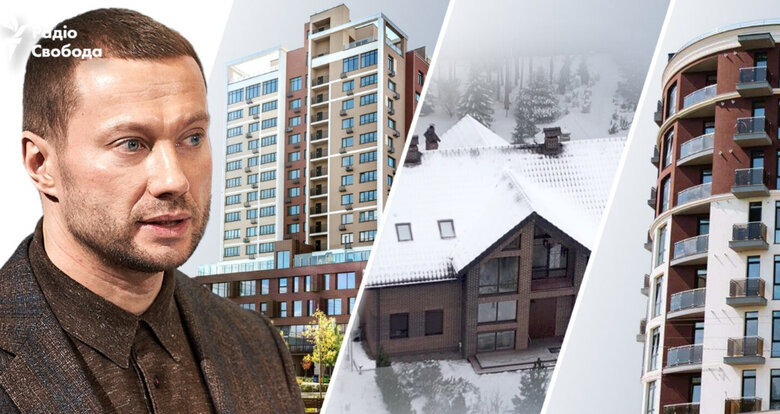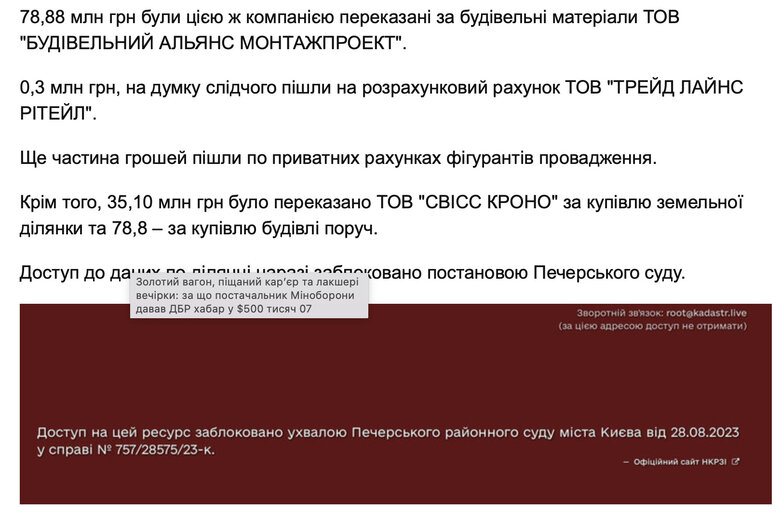To hide loot. How MPs save their wealth under guise of caring about defence
The last week was marked by some over-activity of MPs in an attempt to protect their property from the attention of journalists and anti-corruption bodies.
At first, MPs tried to reduce the period of lifestyle monitoring, and then to restrict journalists' access to information sensitive to their reputation.
On 12 March 2025, MP Oleksandr Tkachenko introduced an amendment to draft law No. 12374-d on lifestyle monitoring:
"Lifestyle monitoring as defined in this article is carried out by the National Agency exclusively for the period when the person in respect of whom it is carried out is in the status of a declarant. The subject of such monitoring may be only assets, income, expenses, services, other elements of lifestyle acquired, made or received by such person in the status of a declarant or income, expenses, services, other elements of lifestyle received by family members of the declarant for the same period. The term of lifestyle monitoring may not exceed 3 months from the date of the decision to conduct it."
According to the shameful tradition of the Verkhovna Rada of this convocation, the amendment was shoved into a draft law on the wrong subject. More precisely, the draft law "On Amendments to Certain Legislative Acts of Ukraine on Strengthening the Institutional Capacity of the National Agency of Ukraine for Finding, Tracing and Management of Assets...". The latter is part of Ukraine's international obligations to the European Union under the Ukraine Facility programme.
The Public Council of the NACP was the first to draw attention to the dangerous amendments.
"Adoption of this amendment will effectively destroy the NACP's ability to monitor lifestyles, despite the fact that this tool has proven effective, allowing it to identify unjustified assets worth about UAH 740 million in 2024 alone," the NACP's public council said in a statement supported by other organisations.
Later, the National Agency itself appealed to the Verkhovna Rada of Ukraine to defend the preservation of the instrument, which has proven to be effective in fighting corruption.
The NACP reminded that based on the results of the lifestyle monitoring inspection, 61 materials worth UAH 231.56 million were sent to the SAPO to file lawsuits with the HACC, and another UAH 30.95 million has already been recovered to the state.
"Restricting the lifestyle monitoring to the period of being a declarant will make it impossible to assess the legality of assets acquired earlier and will allow explaining the origin of assets as legitimate income before the start of public service. This creates a risk of legalisation of unjustified assets and exemption from liability after dismissal," the NACP stressed.
"Implementation of the lifestyle monitoring only for the declarant and their family members will allow unscrupulous officials to register assets in the names of third parties without the possibility of their detection. Instead, the current monitoring procedure allows us to detect such cases," the statement said.
"Limiting the term of the lifestyle monitoring to three months. Monitoring takes time to analyse a large amount of data, make international requests and analyse financial documents in detail. Even simple lifestyle monitoring can take six months, and in complex cases, more than a year. The proposed timeframe will make effective detection of corruption impossible," the NACP stressed.
If you do not understand what lifestyle monitoring is and how it threatens MPs, here is a recent example. It was lifestyle monitoring that revealed that MP Iryna Allakhverdiieva (now Kormyshkina) had illicit enrichment of over UAH 20 million.
The investigation established that in 2021-2022, Allakhverdiieva acquired assets worth more than UAH 20 million, which exceeded her declared income and savings for this period. The MP used these funds to purchase a house near Odesa, where she lives, through a legal entity.
Last month, the MP was forced to resign her seat. And this week, the court found her guilty, gave her a suspended sentence and ordered her to pay 20 million to the budget. Her husband received the same punishment.
Another case of lifestyle monitoring that led to a nationwide scandal is the story of Pavlo Kyrylenko, the still-unfired head of the AMCU. After the article by "Schemes" reported that Kyrylenko's wife's relatives had purchased "elite property" in Uzhhorod, Kyiv and the region worth UAH 70 million, which theoretically did not correspond to their earnings, the NACP began to check the official's lifestyle. As a result, he received a suspicion from the NABU and the SAPO.
I'm not going to tell you the story about how it all came from earnings from raspberries. You already know it.
Thanks to lifestyle monitoring, cases were opened against MPs Pavlo Khalimon and Marharyta Shol. Moreover, in 2023, the then Deputy Head of the NACP, Artem Sytnyk, told Censor.NET in an interview that it was lifestyle monitoring that allowed law enforcement to adequately respond to violations by MPs and officials when the declaration process was frozen.
Officials and MPs are not the only ones. On 3 December 2024, the Appeals Chamber of the High Anti-Corruption Court upheld the decision of the first instance court that declared UAH 7 million in assets acquired by the deputy head of one of the SBI departments and his wife, a prosecutor at the regional prosecutor's office, to be unjustified.
The court ruled that the apartment in Kyiv, "acquired in early 2020 for almost UAH 3.8 million and registered in the name of the defendant's grandmother, and a parking space purchased in the same period for UAH 0.7 million and registered in the name of the defendant's aunt", were unjustified assets.
Do I need to go back and remind you that it was MP Tkachenko who proposed to remove the monitoring of grandmothers and aunts?
Here are a few more examples of the impact that lifestyle monitoring can have.
Last year, the SAPO filed nine lawsuits with the High Anti-Corruption Court (HACC) seeking to declare assets unjustified and recover them for the state's revenue for about UAH 42 million in relation to the
- 6 land plots and a house in Kyiv region worth UAH 8.6 million of the head of one of the sectors of the "Pivdennyi" customs post of the Kyiv Customs. The HACC recovered the property for the state at the request of the SAPO;
- a vehicle and cash, i.e. assets worth about UAH 6.9 million, of the head of the Territorial Service Centre of the Ministry of Internal Affairs in Dnipropetrovsk region. The HACC declared the assets worth about UAH 6.7 million unjustified and recovered them for the state;
- UAH 2.45 million of the Deputy Head of the Criminal Analysis Department of the National Police of Ukraine;
- more than UAH 4.47 million of the head of one of the departments of the Department for Combating Drug Crimes;
- UAH 5.18 million of the head of one of the departments of the Central Interregional Department of the State Migration Service of Ukraine in Kyiv and Kyiv region;
- UAH 4.5 million of the head of the Main Department of the State Tax Service in Poltava region;
- a residential building and a land plot worth UAH 2.63 million of the head of Verkhnokoropetska village council in Zakarpattia region;
- UAH 8.7 million of the Deputy Head of the Main Department of the National Police in Kyiv;
- UAH 3.31 million of the head of a department of the Main Department of the National Police in Kyiv.
Of course, there are many who want to stop this process. Otherwise, we may not be able to recruit the future candidates from the right obedient people.
Following the NACP's appeal, the Anti-Corruption Committee first partially approved the amendment, then rejected it. The head of the Anti-Corruption Committee, Anastasiia Radina, said that these provisions contradicted Ukraine's European integration commitments.
But despite the fact that the deputies have withdrawn the draft from consideration, they can return to it. And make an amendment from the floor. Or introduce it through another bill.
But that's not all the threats. On 27 March, MPs will try to pass in the first reading draft law No. 11533, which will close down information about real estate, which is the main source of journalists for investigations.
The draft law is presented as if to "improve the security of defence enterprises". But, as Volodymyr Zelenchuk, a lawyer at the Institute of Mass Information, notes, under the guise of this goal, it is proposed to restrict access to information from registers, in particular, the location of real estate and data on land owners.
At the same time, law enforcement officials will be able to see information about people who have accessed the registers, even without criminal proceedings.
Zelenchuk quotes the opinion of the Verkhovna Rada Committee on Legal Policy, which states that even the Specialised Anti-Corruption Prosecutor's Office notes that amendments to Section VIII "Final and Transitional Provisions" of the Law of Ukraine "On State Registration of Real Property Rights and Encumbrances" propose to restrict access to information on the location of real estate objects, all registered rights to real estate and their encumbrances, but not objects used or owned by enterprises, related to the field of national security and defence, as defined in the idea of the draft law.
It is interesting that when Censor.NET wrote about the leak of information about defence companies a year ago, MP Fris (the author of this draft law) did nothing to save them. He only joined the ranks of those who sympathise with defence companies that miss the deadlines for delivering weapons to the frontline and therefore do not want to pay fines (which are the only mechanism of influence of the buyer on the supplier). Fris is also one of the authors of the scandalous draft law on "bona fide" purchasers, which eliminates the last mechanisms to take back stolen land.
By the way, when the author of the article needed to find the land plot of the scandalous Hrynkevychs, suppliers to the Ministry of Defence, it was impossible to do so because this information was closed by the court. But the journalists were able to find the family's property. In particular, the transferred property to the owner of the Busk cannery.
The ultimate beneficiary of the BKZ firm, Oleksandr Lapshyn, received two apartments as part of a cash loan from Hrynkevych's wife, allegedly because of the latter's debt.
If there is a law, we won't find anything so easily.
The media are now preparing to monitor who will vote for these amendments by name.
But everything that has been happening over the past week raises serious concerns about where we are going. Last week, there was a scandal over a draft law by MP Ionushas that would give the National Guard of Ukraine the right to disperse protests with firearms and tear gas.
Earlier in the week, the AntAC reported that no prosecutor with a fake disability had been fired.
At the same time, on Wednesday, the Rada voted down a law abolishing special pensions for prosecutors.
And now the same Rada will try to do everything to prevent journalists from digging into their hidden wealth.
Maybe we should also return Yanukovych and his Mezhyhirya?
Tetiana Nikolaienko, Censor. NET




